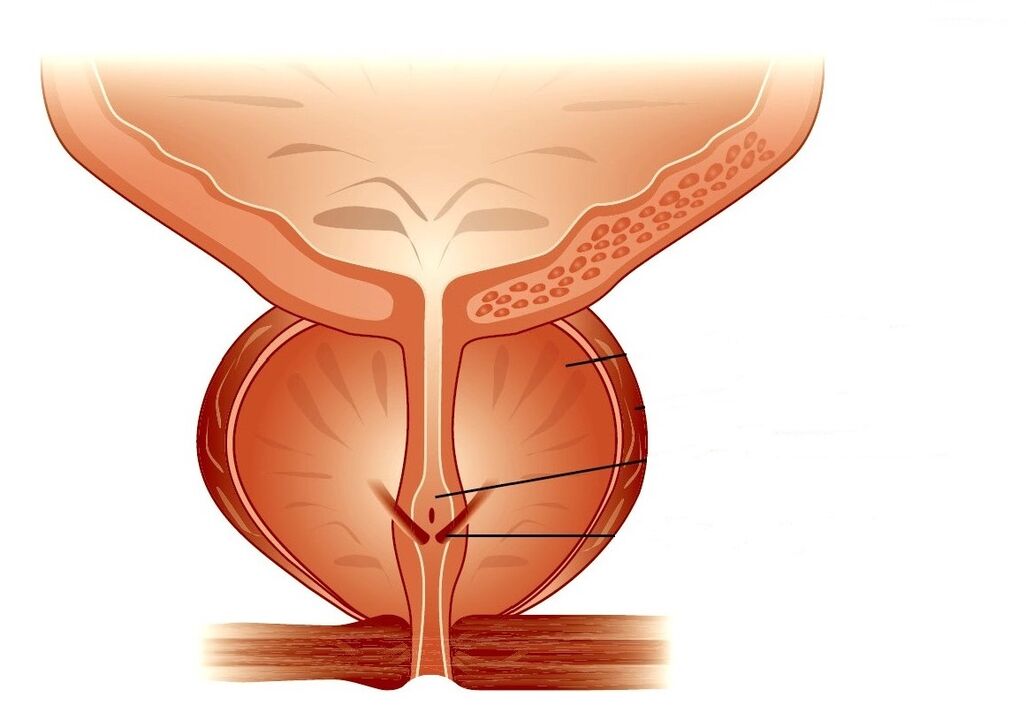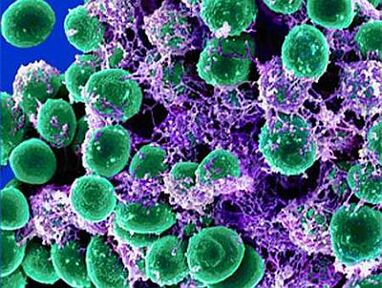What is chronic prostatitis? First, you need to understand what the prostate is, it is also the prostate. This is an organ unique to males that develops during fetal development and exists throughout life. The prostate is an exocrine gland, i. e. develops its secrets and brings it out.
Due to its location, it is not visible from the outside because. located in the male pelvis. It is a circular shape that sits below the bladder and near the pelvic floor muscles, rectum, ureters, urethra, and the blood vessels and plexuses of the small pelvis. Since this organ is an exocrine gland, it is necessary to understand its function. First, she developed a secret, which is one of the important components of a man's sperm. This secret contains a lot of protein, amino acids, etc.
Unfortunately, both men and doctors pay little attention to the prostate.
So what exactly is chronic prostatitis?

This is an inflammatory disease of the prostate. This inflammation can be acute or chronic.
No chronic disease starts spontaneously; it always precedes some degree of acute inflammation.
In some cases, men may not notice the appearance of the disease, but it can persist for a long time without a cure, leading to severe morphological and functional impairment.
Chronic prostatitis usually occurs at least three months after acute inflammation of the prostate.
Due to this inflammation, the morphology of the cellular components is disturbed and the function of the prostate is affected.Epidemiology

The disease is one of the most common inflammatory diseases in men. The disease is very young, i. e. it affects men of all ages. If prostate adenomas are more common in old age, chronic prostatitis can appear in men and at age 20. The average age at which symptoms of the disease are detected is 40-50 years old.
Later in life, almost everyone suffers from the disease, but many of them cannot even be treated and complain of certain symptoms without seeing a doctor.
Meanwhile, in chronic prostatitis, symptoms may not appear immediately, and the man may turn to other problems that he considers more serious. The original cause will only be revealed until another disease is treated. Chronic prostatitis is inevitable if the wrong treatment is carried out in the case of acute inflammation.
Causes of chronic prostatitis
First, when determining the cause of the development of prostatitis, it is necessary to identify the predisposing factors. There are many of them and they are common in the modern world.
These are mainly infectious agents. The more common cause is microbial etiology. Microbial infections can be nonspecific or carry specific pathogens. Specific pathogens include sexually transmitted infections. Given that in men, many of these infections can be completely asymptomatic, they can then persist in the body for a long time. Even the most seemingly unexpressed chronic infection can lead to prostatitis.
The emergence of non-specific pathogens among the causative factors may be due to non-compliance with personal hygiene rules and infrequent cleaning of the glans after urinating and shortly after sexual intercourse.
In some cases, a partner's vaginal dysbiosis or some women's opportunistic pathogens play a huge role in the development of prostate inflammation in men.
The most common inflammatory pathogens are as follows: Chlamydia, Trichomonas, Neisseria gonorrhoeae, Gardnerella, Escherichia coli, Staphylococcus, and Enterococcus.
Don't forget the possibility of viral and fungal involvement

In this case, the pathogen enters the body in an ascending manner, that is, through the urethra.
In addition, there is another important way of infiltration of infectious sources - blood-borne. Many men have some kind of inflammatory disease, and sometimes the flu or SARS can also trigger the inflammatory process.
Hypothermia, weakened immunity, and even overheating when an infection is already present in the body can trigger the development of inflammation.
Sexual behavior also plays an important role in the development of an inflammatory response. In this case, prolonged sexual abstinence negatively affects the state of the glands, it causes blood to stagnate in the pelvic organs, the blood supply is disturbed, and the perfusion of the organs slows down.
Interruption of sexual intercourse and incomplete sperm discharge lead to stagnation of organ secretions, crowding and enlargement of organs, affecting the process of blood supply, and even causing slight swelling of surrounding tissues. In rare cases, the disease is immune in nature. Autoimmune factors are not excluded. Chronic somatic infections should also be excluded.
Chronic prostatitis symptoms and treatment
Chronic prostatitis symptoms in many men may not be present at all. Some people can't even name exactly one trigger or the other. However, the disease has many symptoms. One of the most popular is pain. Pain syndrome can be long, sometimes months.
Pain is usually not limited to a specific location. It is usually diffuse and tends to irradiate the lower back, perineum, scrotum, and groin area. But by no means they were there. Mostly, they are pulling and sore, the pain is not permanent. They tend to increase or decrease depending on the state of the body and the influence of environmental factors.
Another important sign is the infractions in the sexual field. Men often complain of erectile dysfunction, which is barely noticeable at first and later on, even after exposure to all predisposing factors.
But chronic prostatitis is never completely impotent. The same goes for ejaculation. At first, it may happen much faster than planned, and in later stages, instead, it slows down, almost to a complete stop. Orgasms become less vivid and emotionally expressive. Sometimes problems related to the sexual area can affect a partner. A very common reason men are diagnosed with chronic prostatitis is infertility.
Men also often experience urination problems. It becomes rapid, sometimes reminiscent of the signs of cystitis. The urge to urinate can disturb a man at night. Sometimes accompanied by pain, cramps and so on. A person can detect the symptoms of chronic prostatitis on their own.
How to diagnose chronic prostatitis in time and start effective treatment immediately?
Usually it does not cause difficulties among experts in this profile. When a man is exposed to any symptoms, doctors can make this diagnosis without additional testing.
Typically, minimal testing is limited to history taking, laboratory tests, and digital rectal examination. A digital rectal exam does not require additional preparation by men. Doctors can determine the size, consistency, and pain in specific areas of the prostate.
Laboratory indicators are not limited to general blood tests. A urinalysis is also necessary, in this case it has certain characteristics. A person needs to pass the last part of urine, the so-called terminal. In it, laboratory assistants must determine the number of white blood cells and the presence of bacterial cells. In some cases, the pathogen cannot be found and you must be tested for sexually transmitted infections.
They also take smears from the urethra. Another very important part of the diagnostic program is the ultrasound. It is done through the rectum using special sensors. Determine the size of the glands, the presence of scars, tumors, edema, etc. It is also important to check the blood supply to the organs.
In some more severe and asymptomatic cases, an invasive biopsy procedure may be required.
To rule out cancer, someone can be sent to test the blood for tumor markers of prostate cancer. It's called PSA. But you need to take it within 10 days of your digital rectal exam.
Treat chronic prostatitis
The sooner treatment for chronic prostatitis is started, the more likely it is to free the disease from its chronic form. You should not resort to self-treatment as prostatitis should be treated by a qualified specialist.

Treatment of this pathology is performed by a urologist. Usually, treatment does not require hospitalization. All existing chronic diseases need to be treated.
First, you should start by changing your lifestyle. It is necessary to exclude accidental sexual relations, the disease of the partner.
You must follow personal hygiene rules. Rinse the glans thoroughly to prevent bacteria from building up under the foreskin. Sexual life should be regular and sufficient ejaculation. Interruption of sexual intercourse should be avoided.
In addition, physical activity should be increased. Move more frequently to prevent blood from stagnant in the pelvis and prostate.
Nutrition should also be adjusted. Try to avoid fast food, spicy, smoky and salty. Sweets should also be limited. Alcohol and drugs should be completely avoided. Men should also quit smoking.
The treatment of prostatitis is also divided into medical and surgical. First of all, for chronic prostatitis, of course, they will start to treat the cause. And since it's often contagious, antibiotics are the mainstay. Its choice is largely determined by the pathogens detected during diagnosis. Preferably, they immediately determine the susceptibility of the microbe to the antimicrobial.
Then the treatment will be more effective and shorter. Antibiotics can be prescribed by a variety of routes of administration. During the asymptomatic part of the procedure, tablet form is usually prescribed. If the chronic process worsens, then they resort to injectable drugs. Treatment of chronic prostatitis may involve multiple approaches at the same time.
An important component of complex treatment is anti-inflammatory drugs. This is usually a class of NSAIDs. Vasodilators are also often necessary to improve blood supply to the pelvic organs and restore microcirculation. They prevent congestion.
Another class of agents used are immunomodulators. Compound therapy should also include vitamin therapy.
Surgical methods are rarely used, but sometimes this is still the only way out. Among these methods, prostatectomy is used. In some cases, it may be necessary to treat complications from surgery. This may be removing a cyst or opening an abscess.
The treatment of chronic prostatitis also includes various physical therapy. For diseases such as chronic prostatitis to have a good prognosis, the established disease should be treated immediately. The effectiveness of the treatment should be monitored by a specialist after a period of time.





























